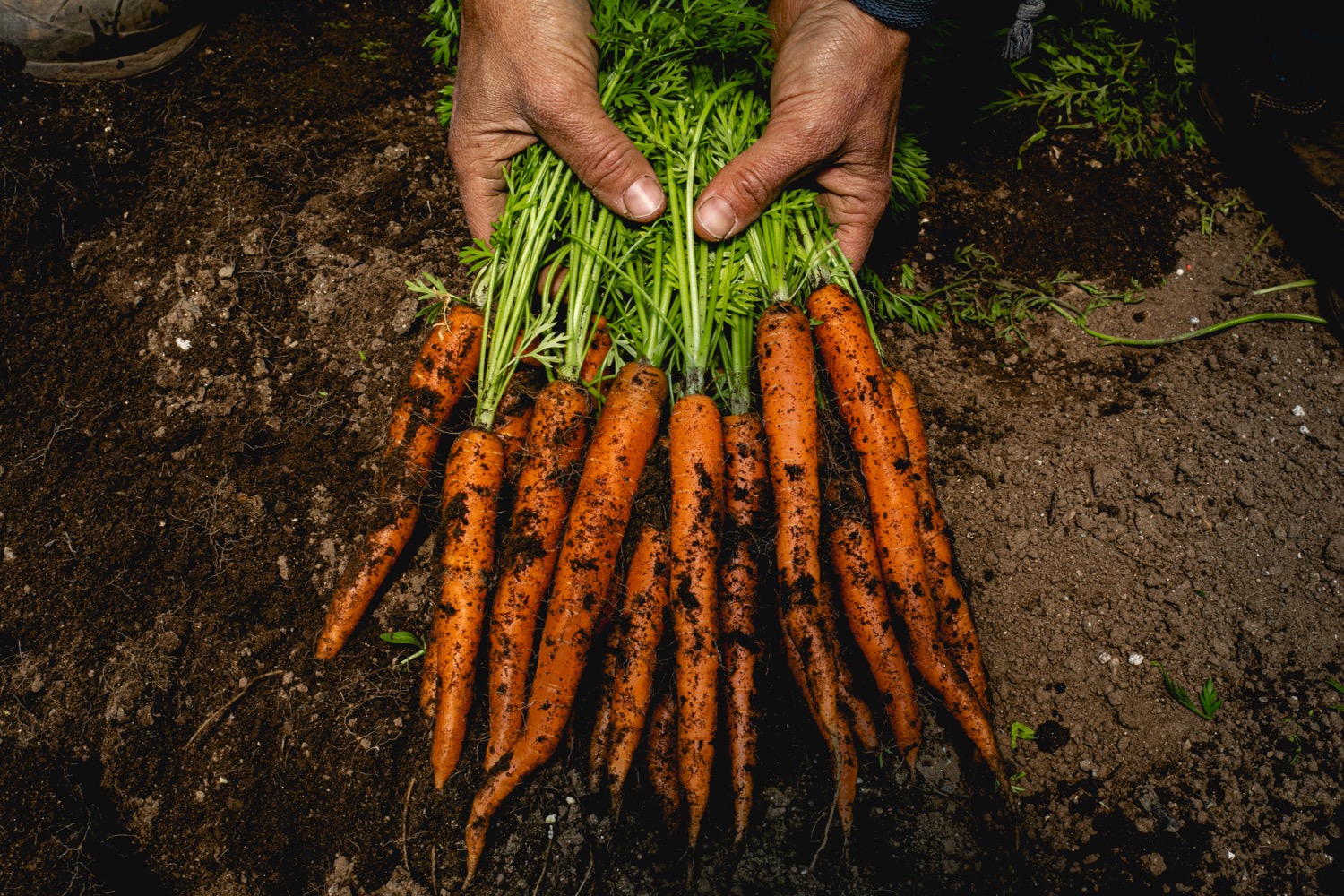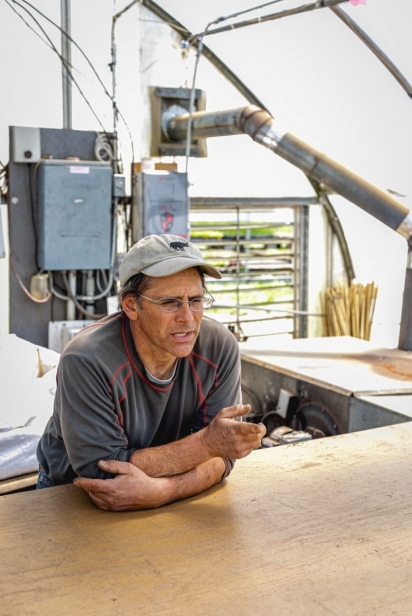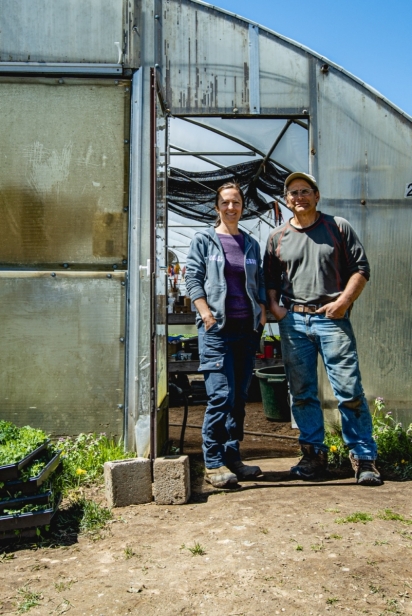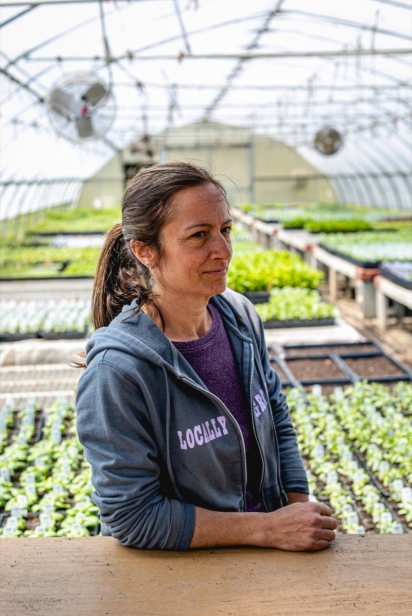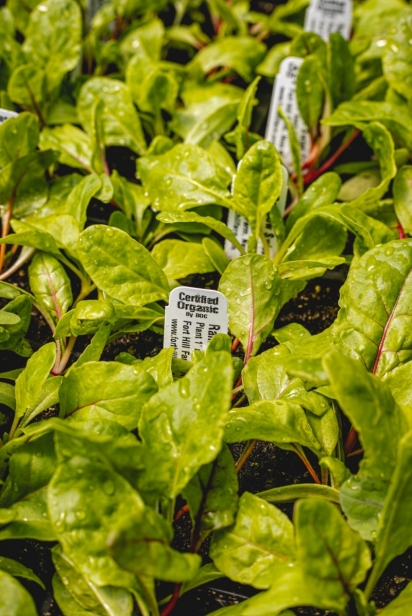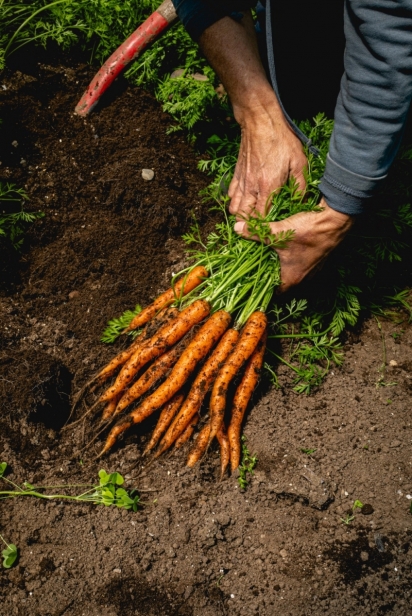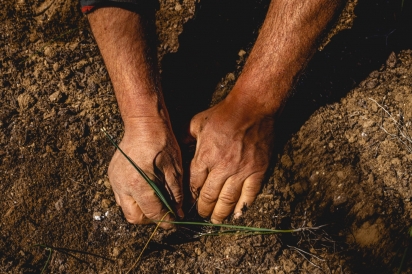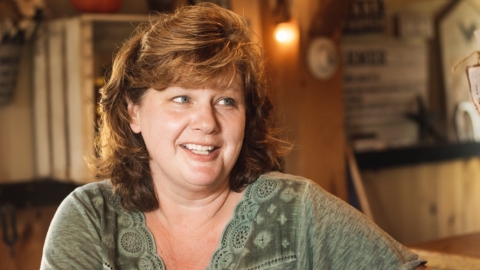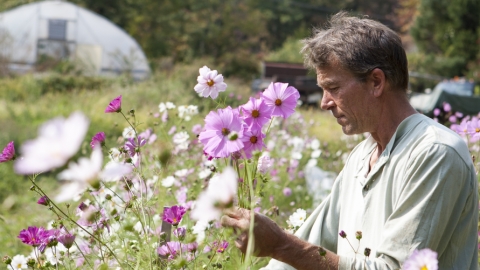Fort Hill Farm
Paul Bucciaglia and Rebecca Batchie have run Fort Hill Farm in New Milford since 2002, when they first began leasing the property from Sunny Valley Preserve, a land conservancy group dedicated to protecting both farmland and wild spaces. This year, 2022, marks their 20th year in operation as certified organic growers. It’s a milestone that brings with it reflection on changes and accomplishments, both in their own farming experience and in the larger sphere of the organic industry in the United States.
Paul grew up gardening with his family in Naugatuck. He studied agriculture at Penn State and plant biology at University of Minnesota before working on farms in Minnesota and Massachusetts. He returned to Connecticut to enter small-scale farming in Brookfield in 1999. He then managed Holcomb Farm in West Granby before settling on his own plan with Rebecca in New Milford. Rebecca, originally from Carmel, New York, trained in horticulture at Stonecrop Gardens in Cold Spring. For a decade, she had her own business through which she designed, built, and grew vegetable gardens. Later, while working with Paul, she completed a degree on Critical Social Thought at Mount Holyoke College before returning to farming. Now, with nine-year-old son Luca in tow, they all eat, sleep, breathe, and work the terrain of Fort Hill Farm full-time.
With early summer planting in full swing, Paul and Rebecca rely on a seasonal crew of growers, apprentices, and farm hands to tackle the immense amount of labor that goes into their operation. They regularly have morning and afternoon meetings to keep on top of the countless moving parts on the agenda, many of which are tracked and updated on a series of busy-looking whiteboards in the barn. From planning and rotating, to planting and irrigating, to weeding and harvesting, the small crew at Fort Hill are rarely without an urgent task this time of the year.
Many of those tasks are managed by Elliott McGann, Fort Hill Farm’s Farm Manager. He is the first to admit that a season’s work at Fort Hill is a team effort, a fact made evident as the crew splits into various groups and switches between assorted tasks and labors over the course of the day. “One of my main jobs on the farm is working with the management team to keep the white boards (where we organize farm tasks) up to date, assigning tasks to the crew throughout the day, and troubleshooting any issues that arise. It’s like a new puzzle every day,” he says, “and I enjoy the challenge of figuring out how we are going to get all the work we need to get done accomplished.”
Notably, Fort Hill Farm’s many moving parts comprise quite a large puzzle. Over the years, Paul and Rebecca have added acreage (they currently manage 36 acres, 15 of which are devoted solely to vegetables) and expanded their list of produce to over 225 varieties, providing one of the larger and more diverse arrays of locally grown food in their area. “I think that is one of the things we are best known for,” Rebecca says, “our wide variety of crops, from fresh ginger and edamame to heirloom tomatoes and organic sweet corn.”
Rebecca manages their eight greenhouses, which constitute a vital part of their growing operation by allowing them to start their season in early spring and extend it into late fall, effectively adding several months onto our region’s natural annual growing period. “Rebecca does such a great job with the greenhouse business,” Paul says, “which helps us with our bottom line. It keeps us going 10 to 11 months, almost year ‘round, from mid-February through December.”
20 years of experience on the same land helps them make the most of those months, having determined what grows best, where, how, and when. Yet, even now, setbacks occur, regardless of their preparation. Rebecca points out that their red lettuce has experienced a “meltdown” (a complete collapse of the plant and crop) the last two seasons. “There are soil pathogens that invade and travel through the vascular system,” Paul says. “But that’s reality. Sometimes we lose crops. It’s unfortunate.”
Despite challenges like these, Fort Hill Farm has managed to thrive, developing loyal customer bases at New Morning Market in Woodbury and the New Milford and Westport Farmers’ Markets. They also maintain their own stand at the farm that offers a wide variety of vegetables, plants and seedlings, pick-your-own crops, and that serves as a pickup location for their CSA program. Recently, the farm added an online dahlia tuber store.
Their robust, diverse list of produce includes late-season harvests to keep CSA customers fed through the Thanksgiving and Christmas holiday feasts, including six varieties of fresh lettuce from the greenhouse and seven varieties of potatoes. Paul and Rebecca laugh, almost in unison, “All but the turkey!” Five years ago, they altered the contents of their CSA program to better match what they grow well. Although it was an adjustment for some customers, many appreciate and understand the importance of harmonizing food with the terroir it will be grown in. “For example,” Paul says, “[our soil] is horrible for growing onions, but it is great for growing really good beans, greens, lettuce, and tomatoes.”
Respect for the land and soil’s natural composition — and what it is best suited for — reflects Fort Hill Farm’s general philosophy toward the practice of farming. Paul references the principles (see sidebar) of the Northeast Organic Farming Association (CT NOFA) as an ethical and spiritual framework for what they do. CT NOFA is just one of the organizations Fort Hill Farm is a member of that tries to promote healthy farming practices and a cleaner environment. On display in their barn is a banner for the Real Organic Project, of which the farm is also a proud member.
Started by Dave Chapman of Long Wind Farm in Vermont and now boasting 1,000 member farms across the country, the Real Organic Project began in 2017 with a mission to enforce stronger organic certification requirements for its member farms. Although the organic food movement has enjoyed great expansion in the United States in recent decades, the prevailing view for some farmers is that the strong ethics and principles behind what was originally a small, grassroots movement have been diminished and depreciated in order to facilitate the growth and profitability of industrial “mega” organic farms. These farms adhere to the USDA’s Certified Organic criteria, but merely in letter rather than spirit. The result is often well-meaning consumers who purchase produce or milk with a Certified Organic label, knowing nothing of the environmental damage caused by industrial monocropping of that produce (even if grown organically) or the often deeply unethical livestock conditions at industrial (and yet technically organic) dairy farms. Real Organic Project member farms are tasked with educating their customers about this from the front line, clarifying the original intent behind organic farming and, in the process, helping to reclaim the organic name.
For Paul, adhering to an ethically grounded business plan has always been the objective. “Farming should have several components,” he says. “The ecological component — so is your soil improving? Are you stewarding the resources that you have? The financial component — are you making a living? And the fairness component — are the customers’ needs being met? Are we paying a living wage? Because farm workers are often neglected and underpaid.”
Despite their wealth of experience, Paul and Rebecca continue to grow and adapt. “We are always striving to be flexible and responsive, identifying and fine-tuning things that aren’t working,” Rebecca says. “We continually examine and reassess both our growing methods and our adherence to our principles to identify areas where we are falling short. I feel like we have reinvented ourselves a few times over. We can’t be afraid to try new things, and we are constantly learning.”
As Rebecca pulls and washes two bright bundles of carrots, it’s clear how close she is to the land she and Paul work. 20 years of doing so have left Rebecca and Paul with a strong sense of the importance of running Fort Hill Farm in both a scientifically organic as well as an ethically organic manner. However, they understand how most people might have a hard time differentiating between these subtleties. “It really can be so confusing for people,” Rebecca says. “I suppose we need to do more,” Paul says. “Maybe we need to up our game and even go to Washington, but if you want the short answer, just get your food from people you know. That really is the best way.” Two decades on, Paul and Rebecca still look forward to meeting and getting to know customers, old and new, each season.
> Fort Hill Farm: 18 Fort Hill Rd., New Milford; 860-350-3158


